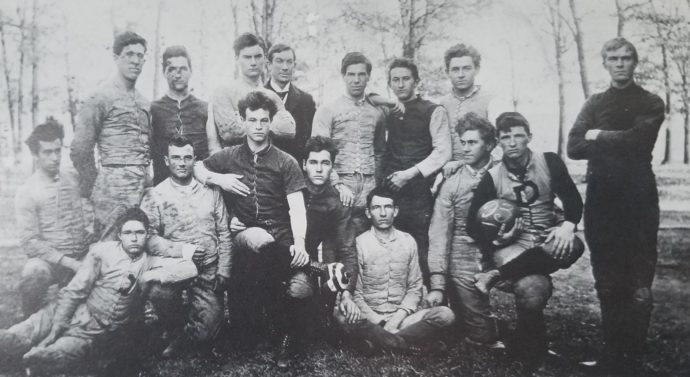
No football, no problem: Why intercollegiate football is absent at Drury University
Editorial September 28, 2018, Comments Off 1697The following is an editorial in which all views, thoughts or opinions belong solely to the author and do not necessarily represent those of The Drury Mirror.
As I walk around campus, I can’t help but catch snippets of conversation from freshmen passersby. A common topic that comes up is why Drury University lacks an intercollegiate football team. To be honest, I had never even considered it, but the class of 2022 piqued my curiosity, so I decided to uncover the truth.
The rumors
I started by asking students around campus. There are surprisingly many rumors about this topic. The most common, however, goes like this: In 1932, a Drury football player died due to an injury on the field during a game. In order to prevent this tragedy from happening again, a wealthy alumna offered to donate one million dollars if Drury cut the team.
While there is a grain of truth in this rumor, this is not exactly how it happened. I spoke to Drury Archivist William Garvin to get to the bottom of things. Garvin explained that a Drury football player did die but not during a Drury football game in 1932, and there certainly was not a million dollar donation to end the program.
The fallen football player was John Clark Allen. Allen’s obituary was published Nov. 23, 1899, in Volume 14 of The Mirror. According to this obituary, Allen left on Nov. 6 to play with the Christian Brothers college team in St. Louis, Mo. During the game, Allen took a violent fall. He died not long after.
This tragic event occurred in 1899, which was 33 years before the Drury football program was dropped. So what was the real reason?
The answer lies in the book, “The Drury Story” written by Dr. Frank W. Clippinger.
Football at Drury
Football emerged at Drury in 1890, sprouting from an intense game of capture the flag between rival classes. Students had been pushing for nearly 15 years for the program, but it wasn’t until a group of freshman flew their flag from the dome of the tallest building on campus that the Board of Trustees thought they should have something better to do with their time.
The first game was played against Washington University of St. Louis, and the Panthers lost 18-0. The first win actually didn’t come until the following season when Drury beat McKendree College.
Interest increased over time, which brought about the annual Homecoming celebration starting in 1924. Halftime entertainment was provided by the Boy Scout Band, which was the world’s largest boys’ band at the time. A football banquet followed the game, and the Commons was always filled to capacity.
But the excitement was short-lived. Just 42 years after its development, the program was disbanded.
The Depression hits hard
In 1932, the Great Depression forced the discontinuation of many extracurricular activities, including football.
Enrollment at Drury dropped considerably, and funding for clubs and organizations was scarce. The football program was especially expensive, as the helmets were made of genuine leather and the field’s upkeep required many hands.
Drury bounced back, however, and Homecoming festivities were revived in 1935, this time to accompany the basketball team. By February of 1939, the Homecoming celebration included a parade, a student-directed comedy-musical revue and a tug-of-war game between classes.
Attempt to revive
In 1947, the Student Senate attempted to reestablish the football team. The attempts were unsuccessful. A committee of students worked with the Board of Trustees, but ultimately, the trustees decided to allocate the funds to the intramural sports program.
The intramural sports program thrived, expanding to involve a variety of sports. Popular among students was (and still is) Ultimate Frisbee.
Does it matter?
While the football program was fleeting, it brought with it lasting traditions that we hold dear today. But how does its absence affect the student body?
The short answer: it doesn’t.
I created a Twitter poll asking the question, “Did the absence of a football team affect your choice to attend Drury?” Seventy-nine percent of respondents answered “No.”
Jacob Maher (@legitmahimaher) indicated that no football was actually better.
“I came here partially because there was no football bois don’t need that toxicity in my life,” tweeted Maher.
Maher is actually on to something there. A recent study by the American Economic Association shows that football games increased the rate of reported sexual assaults by 41 percent on home game days and 15 percent on away game days.
Another article from The Atlantic argues that colleges may be better off without football. According to this article, barely half of the teams in the Football Bowl Subdivision generated a profit. It’s also possible that football is linked with an overall lower median GPA campus-wide.
Perhaps, Drury is better off without it.
Article by Delilah Gadd.